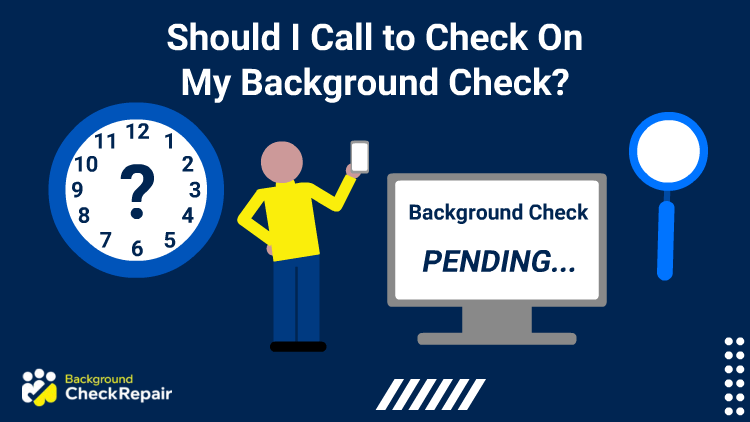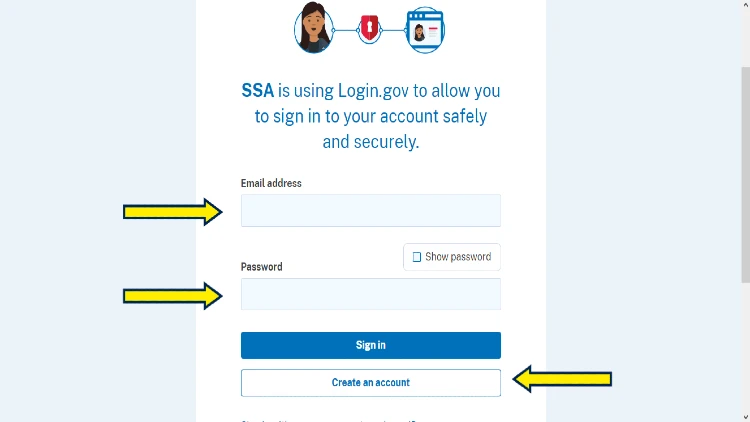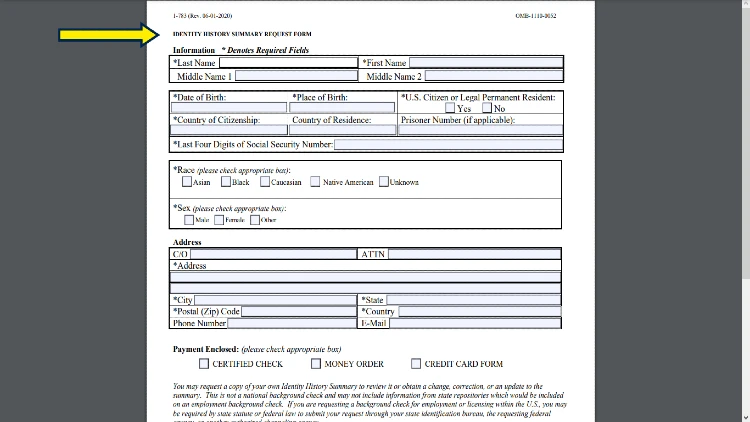
Many individuals applying for a new job ask themselves, “should I call to check on my background check?”
When the results are taking (what seems like) a long time…it’s easy to worry. But, instead of contacting an employer to check on the status of a background check, there’s a much easier and more comprehensive way to know if you passed.
Do this: Run a records check on yourself.
Instead of relying on a third party to tell you what a background investigation may reveal, you’ll get the report and see all the public records a potential employer, agency, or financial institution will.
Running a background check on yourself is the best way to know whether some inaccurate or old conviction record will cause a botched background check, and you can use the information to remove criminal records.
There are two ways to do it. Either contact an agency to get a complimentary criminal history check report, or search your public records yourself.
The following guide explains all the checks that are used in various background screenings, so you can examine and correct any disqualifying offenses and won’t need to ask, ‘should I call to check on my background check.’
How Do I Know If My Background Check Cleared?
There are specific steps that an individual can take to see if their background check has cleared. Those curious about their background check status can run a background check on themselves as soon as possible to see what is listed on the check, how to respond to the information, and how to edit incorrect information in the check.
Determining the quickest and most reliable way to run a background check can help a person be prepared for questions or concerns in the future.
Since a background screening gathers comprehensive information, including criminal history, employer history, credit information, aliases, names, and much more, when doing a self check, examine each area.1
One of the first things an individual should check when running a background check on themselves is to check social security information by going to the Social Security Administration.32 Completing this step can help an individual ensure their social security number is correct and registered correctly in the system.

- Visit the Social Security Administration.31
- Click on ‘Create your account.’
- Enter email address, select language preference, and click ‘Submit.’
- Click on ‘Review Your Information’ or ‘View Your Latest Statement’ to obtain social security information.
Gather a Credit Report
The second step in preparing for a background check is to find a credit report and gather a credit history. Credit history is the best way to determine a person’s financial history, taking into account loan information, debts, credit lines, credit history, bankruptcy filings, outstanding accounts, balances, and current/previous bank accounts.
Running a free credit report can help an individual be prepared for what may appear on their background check during an employee check.2
1. Third-party sites – Searchers can use third-party websites to run credit checks, such as Experian, Credit Karma, or Equifax, to view their credit history.
2. Annual Credit Report – this website provides a free yearly credit report from a credit-reporting agency.14
- Online – Visit Annual Credit Report.
- Phone – Call 1-877-322-8228.
- Mail – Complete the request form and mail it to:
Annual Credit Report Request Service
PO Box 105281
Atlanta, GA 30348-5281
3. Contact the credit card company to obtain a credit score (not a credit report.)
4. Contact the Consumer Financial Protection Bureau if there are concerns about the credit report (false information, mistakes, etc.)18
Check the Criminal Record
The third step of preparing for a background check is to check a criminal record. Individuals who know their previous criminal history in their state and the country, including prison information, parole history, arrests, convictions, pending cases, warrants, and probation, can help a person be prepared.
There are two methods individuals can use to find a criminal record — using local/state resources and federal resources. Those who may have a crime in a specific state should use their local police department to find local and state records, including state prison records, county sheriff records, city jail records, police department records, or state department of correction records.
The best way to find local and state records is to use a local county sheriff’s office or state police department to request records.
For example, individuals who wish to obtain a background check in Tennessee can pay an extra $29 to include criminal history in their background check.33
The second method of finding a criminal record is to use federal resources to find Bureau of Prisons records for nationwide crimes or convictions.26
The third method is to obtain an Identity History Summary through the FBI website.3

1. Electronic — submit an electronic request here under “Obtaining Your Identity History Summary.”20 Individuals can submit their fingerprints electronically through a USPS location.25
2. Mail — Individuals must complete the application form and obtain their fingerprints on the standard fingerprint form FD-1164.22,23
Individuals must make their payment through the online Credit Card Payment Form or get a certified money order for $18 payable to the following address:19
FBI CJIS Division – Summary Request
1000 Custer Hollow Road
Clarksburg, WV 26306
3. FBI-approved third-party system — The last way to find your own criminal history through the FBI website is to use a third-party-approved system.24 The FBI allows private businesses that are contracted with the FBI to submit relevant data to individuals.
Obtain Court Records (Evictions, Divorce, Etc.)
In addition to criminal records to find convictions, arrests, and charges, searchers can use the PACER System to find court case information related to pending charges, past charges, or cases.13
- Online — Visit the National Archives.34
- Click on the Order Reproductions page.36
- Click on “Court Records.”
- Select the type of court (Court of Appeals, Civil, Criminal, or Bankruptcy.)
- Mail-in — Download the form for the specific court type (ex: Civil Cases Form) and mail the form to the corresponding facility.35
- In-Person at state and local level — Contact a local magistrate office and fill out a request form.29,30 (ex: Pennsylvania)
Driving Record
Another way an individual can prepare to run a background check on themselves is to get a copy of their driving record through the state Department of Motor Vehicles. Any person can find their driver’s license, past accidents, violations, points on their record, fees, citations, parking, and fines for a small fee.
- Contact the state DMV (ex: Pennsylvania DMV) and pay the fee to obtain an official copy.15
- Insurance agent – contact the insurance company to obtain a free copy of an official driving record
- Third-party background check company can provide a copy of a driving record
Education History
The final way an individual can prepare to run a background check on themselves is to analyze their education history. By making sure transcripts and educational information, such as the names of organizations and the dates of enrollment, are correct, individuals can avoid any surprises during the background check.4
Once individuals have addressed the basic information included on a background check (criminal history, driving history, employment/education history, driving record, and credit history), they can then search for more detailed data.
- Contact the educational institution to request a transcript.
- Find the contact information of a school’s registrar or student counseling office.
- Use the National Student Clearinghouse.27
What Does a Background Check Show? (With a Pre Employment Background Check, What Shows Up?)
The basic information in a pre-employment background check includes credit history, criminal history (felony and misdemeanor convictions, pending criminal cases, history of incarceration), driver’s history, employment verification, and identity verification.5 However, the information shown in a background check depends on the type of check and the state.
For example, professional background checks are limited by specific state and federal laws. These regulations control how the information can be used and require consent from the person being investigated. In this case, if a person is running a check on themselves, they can give consent before doing the check.
When deciding what type of background check to run, there are different levels — level 1, level 2 check, level 3, and an FBI fingerprint-based background check. All of these checks include various levels of information and detail.
What Comes Up on a Background Check?
A level 1 check is conducted using a name and verifies a person’s name, address, employment history, and residency. This search uses state and local law enforcement public records that show felony crimes and misdemeanors, arrests, pending arrests, convictions, and incarceration data. Additional information included in a level 1 check that can be added by the searcher consists of social media information, public information (through search engine sites), and credit history.
A level 2 background check is a national search that is conducted using fingerprints against state and national crime databases. This level of check is used to verify the identity of those in specialized occupations and rule out disqualifying crimes.6 The information in a level 2 check which is NOT included in the level one check is the driving records and social security number verification.
A level 3 records check includes all the information contained in both level 1 and 2 checks but can sometimes include information beyond the 7-10 year lookback period for a person’s history. This type of check is usually the most common background check for a profession, including education, criminal history, employment history, and reference information.
A Level 4 background check is a less-common check used almost exclusively for corporate executive hires. This check includes information in level 2 and 3 searches, a media search, and a federal bankruptcy search.7
The last two types of checks are FBI background checks and fingerprint-based checks — although they are very similar in checking federal sources, they slightly differ in their purpose and methods.
- Fingerprint check — Individuals must use the FBI Identity History Summary.21
- FBI background check — Individuals can use this check for a government position.
The information included on these checks includes citations, criminal history, residency history, personal identification information, and credit history.
Can I Check the Status of My Background Check?
Searchers who want to find more information about their background check, like the status and information available, must keep in mind that the answer depends on the type of background check.
If a candidate applies for a specific job where they must consent to a background check by the company, they can usually find the status of their background check through the hiring portal. Candidates can also contact the hiring manager to ask about the status of the check.
Those who have submitted a criminal history request online to view their criminal record may need to use their state’s online portal to find more information. For example, in Pennsylvania, users can do the following:16
- Mail-in requests — Call 888-783-7972 to find the control number.
- Online — Click on ‘Record Check Status’ and enter the control number.17
Should I Call Employer About Background Check?
Those who are applying for a vacant position or who would like to gather information about the hiring process should consider if asking about a background check is beneficial or harmful to their chances. Although it can be good to be proactive, prematurely asking about a background check could potentially backfire.
A person applying for a job or new role should be prepared to have an employer ask about a background check. Employers MUST have written permission from a person before they can conduct a background check — applicants can say no, but this could be detrimental to their chances.
Suppose an applicant is worried about what may appear on their background check and is applying for a specific job role (i.e., healthcare industry or medical field). In that case, they can ask about the background check to be prepared ahead of time. This way, they can warn an employer about any black marks on their record.
Since there is no law stating that an employer must notify a person about the status of their background check, a curious applicant should call the employer if it has been a long time without any response from the company.8 However, a company DOES have to let an individual know if the hiring decision was based on the information provided in the background check.
How To Check on Your Background Check?
There are a few steps individuals should follow if they want to check on their background check. Of course, it depends on the specific company that ran the test to know how to obtain information and view the status of the check.
For example, applicants who have applied to Walmart must be aware that all information included on the check (name and ID verification, criminal history, professional license authentication, driving history, credit and tax records, and previous employment). In contrast, Walgreens only takes into account name and ID verification, criminal history, professional license verification, and previous employment history.
Let’s take Walmart as an example.9
- Wait to be called in for an interview after the first step of the application.
- Complete the in-person interview.
- Go through the pre-employment checks (background check and drug testing.)
- Wait to be contacted by a Walmart employee.
- Walmart employees conduct background checks through Background Checks company.
Fair Credit Reporting Act: Background Check Rules
The Fair Credit Reporting Act is a set of compliance standards that regulates the background screening process.10 This federal act regulates the information employers can use in background reports when screening a potential job candidate. The purpose of the FCRA is to help protect job applicants by ensuring they can view their information, they are informed of a background check, and they can appeal unfair hiring decisions.
The FCRA requires employers to follow these laws when it comes to background checks:
- Employers must provide a notice to the applicant regarding what information is included in the check.
- Employers must obtain a written consent form to perform the consumer report.
- Employers must provide the applicant with a notice of the copy of the consumer report, a Summary of Your Rights, and time to review the report to confirm or deny the findings.
- Employers must provide an applicant with a notice after the background check describing the information on the Consumer Reporting Agency in the report.
What Causes a Red Flag on a Background Check?
There are a few common red flags on background checks to look out for:11
- Long spells of unemployment — Long periods without a job, whether due to personal issues, illness, or career changes, can indicate an unreliable employee.
- Multiple short jobs — Multiple jobs within a short time frame can indicate a lack of teamwork and cooperation.
- Inconsistency in education — High-reaching job titles without proper education is a red flag.
- Criminal record — Individuals with a criminal record will have a more challenging time getting a job in many sectors, as this mark on a person’s record can indicate potential deceitfulness or unlawfulness.
- Job-related convictions — A person who has committed a crime during their job can be seen as untrustworthy.
- Poor credit history — Lack of care regarding financial decisions could be a red flag for most employers.
Individuals who wish to find more information about a background check should first run one on themselves. This way, they can be prepared during a hiring process in terms of what the employer may find in their criminal history, credit report, employment verification, education history, residency history, and much more. Understanding the answer to “should I call to check on my background check” can help searchers put their minds at ease.
Frequently Asked Questions About Should I Call To Check on My Background Check?




